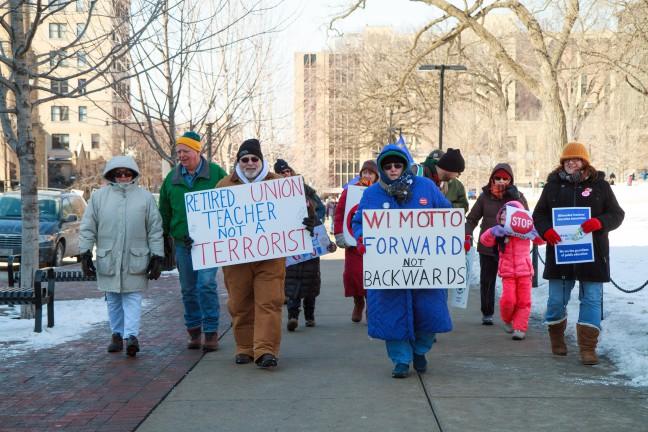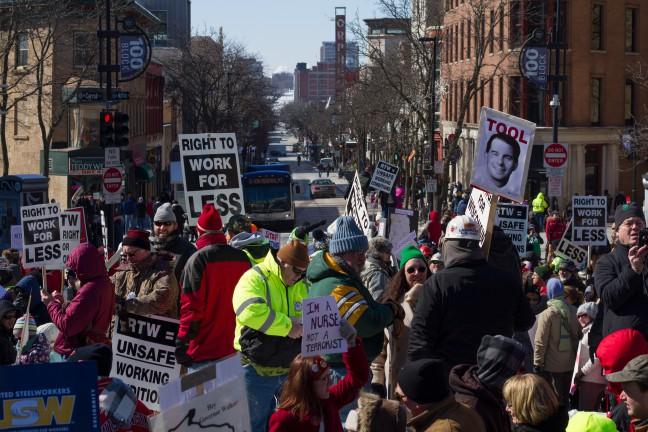Thousands gathered outside the Capitol over the weekend to protest the proposed right-to-work bill as it moves on to the Republican-dominated Assembly for voting later this week.
The bill already passed in the Senate last Thursday, and if the Assembly passes, Gov. Scott Walker’s office has said he would sign it when it gets to his desk.
Majority Leader Sen. Scott Fitzgerald, R-Juneau, a proponent of right-to-work, said in a statement this legislation will modernize Wisconsin’s economy and further individual freedoms to choose where their money is spent.

“The heart of this issue is a simple matter of individual freedom: this legislation will ensure that Wisconsin’s workers have the sole power to determine whether they wish to belong to or support a labor organization, and ensure that they cannot be punished for that decision in their workplace,” Fitzgerald said.
In contrast, Wisconsin State AFL-CIO President Phil Neuenfeldt said in a past interview right-to-work legislation will move Wisconsin in the wrong direction.
Right-to-work legislation is relatively new to the Midwest, with similar laws passing in Michigan and Indiana, Neuenfeldt said. He said the 24 states that have right-to-work laws in place statistically tend to have lower wages and lower incomes.
“When you attack the labor movement and union contracts and the wages and benefits that they bring for people, you’re basically opening up a scenario where it’s lower wages and weaker benefit plans for all of the middle class, because that kind of sets the standard,” Neuenfeldt said.
In the U.S., unionized workplaces can be classified as union shops, agency shops and open shops.
If a worker is hired at a union shop, the worker may be required to either join the union or pay an agency fee which covers only the parts of the union dues, which include the cost of collective bargaining and representation of employees. If a worker fails to do so within a certain period of time, then he or she may be terminated.
Another unionized workplace is an agency shop. Like the union shop, workers must at least pay the agency fee; however, they are not required to join the union itself to remain employed.
Open shops, also known as merit shops, in contrast, do not require workers to join a union or pay any dues either to be hired or remain employed.
If passed in Wisconsin, right-to-work legislation would essentially turn all unionized workplaces into open shops. Proponents of right-to-work legislation say this gives workers individual freedom to choose whether they support the union, whereas opponents say it weakens union’s collective bargaining and ability to negotiate on a worker’s behalf.
John Ahlquist, an associate professor in UW’s La Follette School of Public Affairs, said Walker’s recent push for right-to-work legislation is more of political move than a business strategy.
“I think Walker clearly has presidential ambitions and is trying to position himself to a broader audience,” Ahlquist said.





















